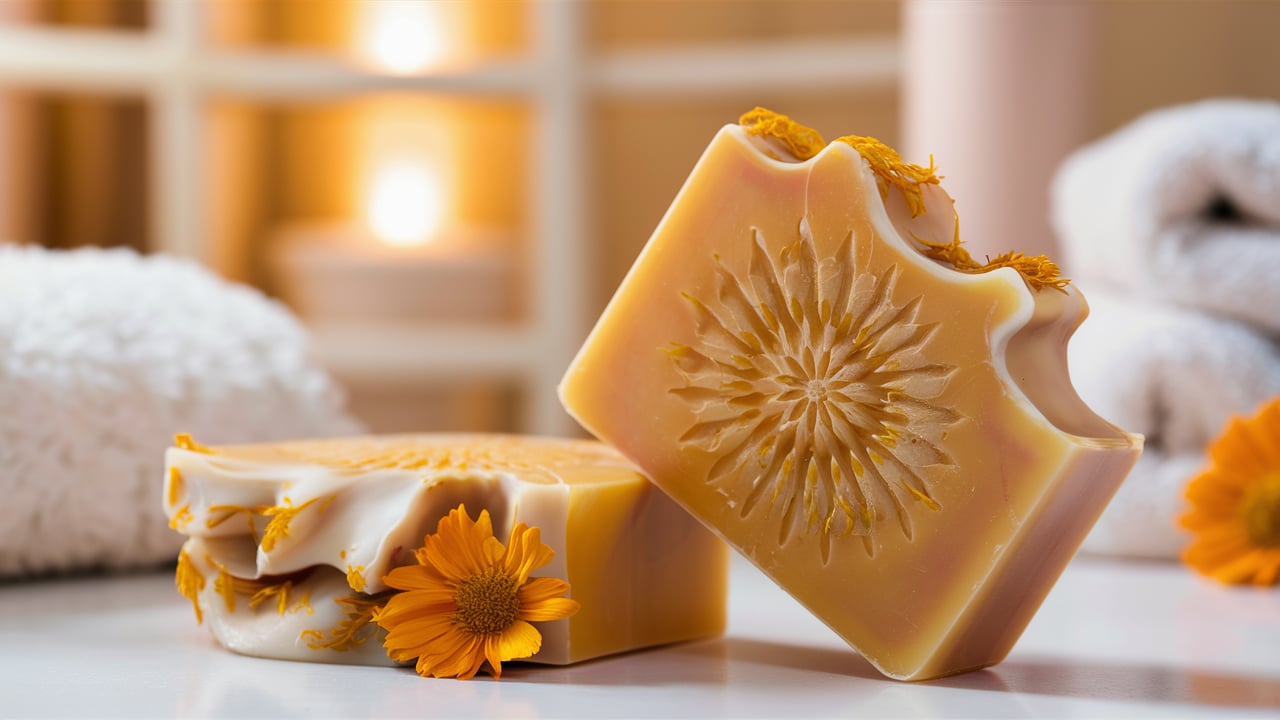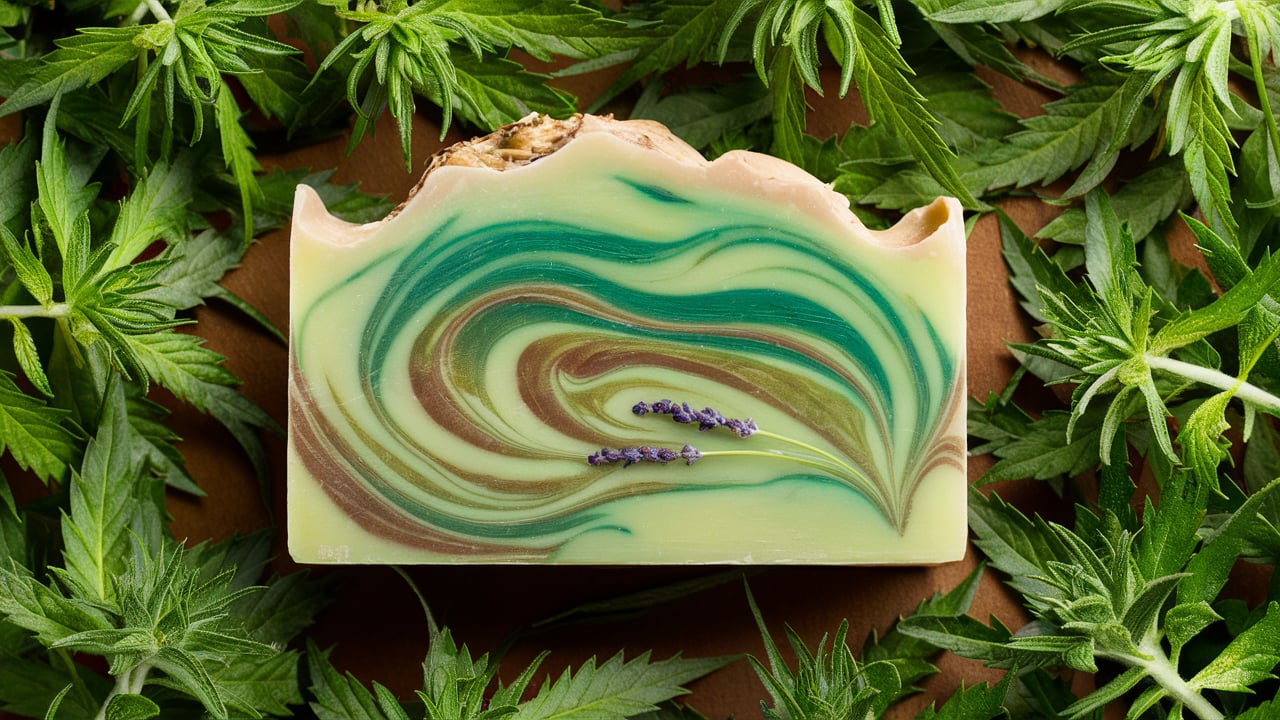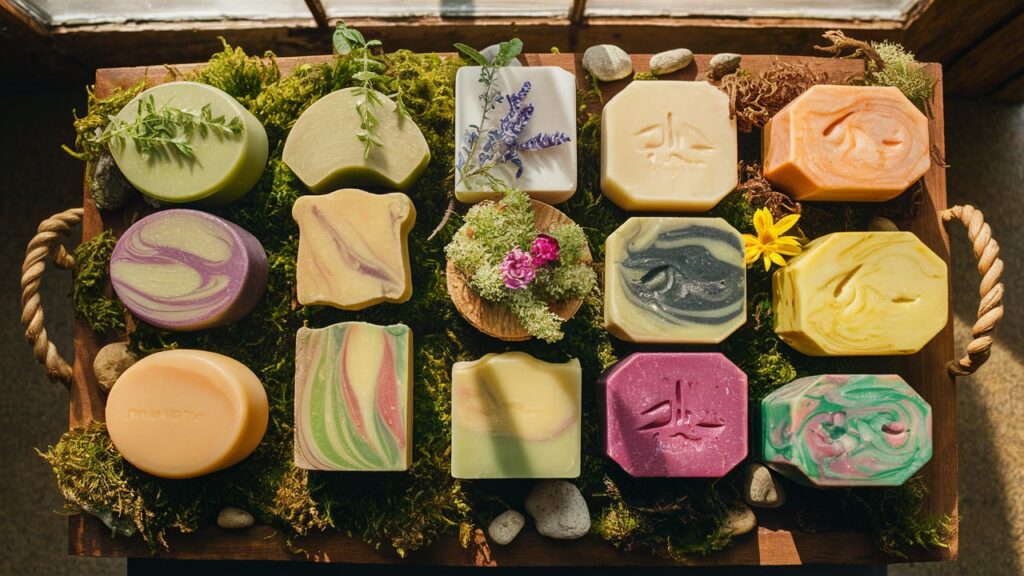Homemade soaps have gained popularity not just for their natural ingredients but also for the customization they offer.
Whether you’re new to soap making or a seasoned DIY enthusiast, understanding the types of homemade soaps available can enhance your crafting experience.
Here’s a detailed exploration of various types of homemade soaps and how you can get started making your own.
Turmeric soap
- Turmeric helps in reducing dark spots and improving uneven skin tone, resulting in clearer skin ➊.
- Curcumin in turmeric reduces skin inflammation, aiding in the healing of wounds and reducing redness.
- Turmeric boosts collagen production and has antioxidant properties that help mitigate skin aging.
- Effective in managing conditions like psoriasis and acne due to its antimicrobial properties.
Turmeric’s magic ingredient is curcumin, boasting anti-inflammatory and antioxidant properties.
These translate to potential benefits for your skin:
- Acne Fighter: Curcumin’s anti-inflammatory nature can soothe irritated skin and reduce acne breakouts.
- Fading Scars & Hyperpigmentation: Curcumin may help lighten dark spots and blemishes left behind by acne or sun damage.
- Glowing Complexion: Antioxidants combat free radicals, which can lead to a brighter, more even skin tone.
- Anti-Aging: Turmeric’s antioxidant properties may help reduce wrinkles and fine lines by protecting the skin from environmental damage.
Is Turmeric Soap Right for You?
Turmeric soap benefits are numerous. The soap can be a wonderful addition to your routine if you have oily, acne-prone skin or want a natural option to brighten your complexion.
However, if you have dry skin, a patch test is recommended to see how your skin reacts.
Additionally, consult a dermatologist if you have any underlying skin conditions.
Neem soap
- Neem soap helps fight acne and skin infections due to its antibacterial and antifungal properties.
- Neem soap retains skin’s natural moisture, leaving it soft and hydrated ➊.
- Helps in evening skin tone by reducing dark spots and blemishes .
- Contains compounds that reduce inflammation and soothe irritated skin.
- Rich in antioxidants, neem soap protects the skin from environmental damage.
Neem oil’s claim to fame lies in its potent antibacterial and antimicrobial properties.
These properties help combat acne-causing bacteria, reducing breakouts and promoting clearer skin.
Struggling with redness, irritation, or inflammatory skin conditions like eczema or psoriasis?
Neem soap’s anti-inflammatory properties can come to the rescue. It helps soothe irritation and reduce discomfort.
Who Can Benefit from Neem Soap?
Neem soap is a versatile option for various skin concerns. Here’s who might find it particularly helpful:
- Acne-prone skin: Its antibacterial properties can combat acne-causing bacteria and promote clearer skin.
- Oily skin: Neem soap helps regulate oil production, leaving your skin feeling refreshed and balanced.
- Dry or itchy skin: While neem can be clarifying, some formulations are gentle enough for dry skin. Look for options with added moisturizing ingredients.
Neem oil has a distinct earthy odor that some might find unpleasant. Patch test before using it all over your face.
Calendula soap
- Calendula soothes skin irritation and inflammation, beneficial for conditions like eczema and dermatitis ➋.
- It promotes faster healing of cuts, burns, and abrasions by enhancing blood flow and oxygen to the affected area.
- Calendula hydrates the skin, making it useful for dry and sensitive skin types.
- Its antibacterial properties help reduce acne and prevent skin infections.
- Rich in antioxidants, calendula protects the skin from oxidative stress and environmental damage
Calendula, also known as pot marigold, is a vibrant orange flower with a long history in herbal medicine.
Traditionally used for wound healing, it’s gaining popularity in skincare for its impressive properties.
Calendula’s natural antibacterial properties can help keep blemishes at bay and promote clearer skin.

Who Can Benefit from Calendula Soap?
If you have:
- Sensitive skin
- Dry or irritated skin
- Eczema or psoriasis
- Acne-prone skin
- Minor wounds or blemishes
Calendula soap is worth considering!
Bubbles and Brews: Discover the Surprising Benefits of Beer Soap
Calendula Soap Benefits: Your Ticket to Luxurious Self-Care
Coffee soap
- Coffee soap contains antioxidants that help protect the skin from free radical damage and aging ➊.
- The caffeine in coffee helps dilate blood vessels and improve blood flow, reducing the appearance of cellulite.
- Coffee soap has anti-inflammatory and antibacterial properties, making it effective for treating acne.
- Studies show that coffee extract can help protect the skin from UV damage and reduce the formation of wrinkles.
- Coffee seed oil can increase collagen and elastin, helping the skin stay hydrated and look firmer.
Ground coffee beans act as a gentle physical exfoliant, buffing away dead skin cells to reveal a smoother, brighter complexion.
Coffee is rich in antioxidants, which can help combat free radical damage and protect your skin from premature aging.
Caffeine, a key component of coffee, is thought to stimulate blood circulation.
Coffee’s antibacterial properties might be beneficial for acne-prone skin. The exfoliation can help keep pores clear, and the antioxidants may reduce inflammation.
Coffee’s exfoliating properties can be slightly drying. If you have dry skin, look for a coffee soap that contains moisturizing ingredients or follow up with a good moisturizer after showering.
Bentonite clay soap
- Bentonite clay helps treat acne and oily skin by absorbing excess sebum and impurities ➊.
- It has antibacterial and anti-inflammatory properties, aiding in reducing skin infections and irritation.
- The clay can detoxify the skin by drawing out toxins and impurities from pores, improving overall skin health.
- It helps in soothing skin conditions like dermatitis and poison ivy due to its calming effects.
- Bentonite clay can balance oil production, helping to maintain a healthy complexion and prevent breakouts.
Bentonite clay is a volcanic ash sediment packed with minerals like calcium, magnesium, and iron. It has a soft, fine texture and forms a paste when mixed with water or other liquids. This paste is what gives it its remarkable skincare properties.
The clay acts like a magnet, drawing out excess sebum (oil) from the skin’s surface. This makes it ideal for oily and acne-prone skin, helping to reduce shine and breakouts.
Who Should Avoid Bentonite Clay?
While generally safe for most skin types, bentonite clay might not be suitable for everyone. Avoid it if you have:
- Dry or sensitive skin
- Broken or irritated skin
- Rosacea
Bentonite Clay Soap Benefits: A Natural Solution for Clear, Healthy Skin
Hemp seed oil soap
- Hemp seed oil hydrates the skin without clogging pores ➊.
- Reduces inflammation and helps treat skin conditions like acne, eczema, and psoriasis.
- Balances skin oil production, which can prevent acne.
- Contains vitamins A, C, and E, which protect the skin from oxidative stress.
- Promotes skin cell regeneration and reduces scars.
The star of the show is hemp seed oil, extracted from the hemp plant (Cannabis Sativa).
Don’t worry, it doesn’t contain THC, the psychoactive compound in marijuana. Hemp seed oil boasts a unique blend of:
Unlike some oils, hemp seed oil is non-comedogenic, meaning it won’t block pores.
The anti-inflammatory properties of hemp seed oil can help calm redness and irritation, making it gentle even for sensitive skin.
By regulating oil production and reducing inflammation, hemp seed oil soap may contribute to clearer skin.
Hemp seed oil is a source of vitamins A, D, and E, all beneficial for overall skin health.

Is Hemp Seed Oil Soap Right for You?
Hemp seed oil soap is a natural and gentle option for most skin types.
If you’re looking for a soap that hydrates without clogging pores, then hemp seed oil soap is definitely worth exploring.
Almond oil soap
- Almond oil acts as an emollient, providing hydration that helps to soften and smooth the skin ➊.
- The handmade natural soap has anti-inflammatory properties that can help alleviate conditions like eczema, psoriasis, and general irritation.
- Regular use can enhance skin tone and complexion due to its emollient nature.
- Ayurveda practices use almond oil to reduce the appearance of scars and soothe the skin.
Almond oil contains vitamin E and other antioxidants, which help protect the skin from damage caused by free radicals.
Most almond oil soaps are made with sweet almond oil, a gentle emollient rich in vitamins and fatty acids. This translates to several benefits for your skin:
Almond oil is a humectant, attracting and retaining moisture in the skin. This makes it ideal for dry or sensitive skin, leaving it feeling soft and supple.
Vitamin E, abundant in almond oil, is a natural antioxidant that may help reduce signs of aging like fine lines and wrinkles.
Some studies suggest the vitamin A content in almond oil might aid in preventing acne by keeping pores clear.
Is Almond Oil Soap Right for You?
Almond oil soap is generally very well-tolerated by most skin types. However, if you have very oily skin, it might not be the strongest cleansing option.
Unleash Your Inner Glow: Almond Oil Soap Benefits
Olive oil soap
- soap retains skin’s natural oils, preserving moisture and preventing dryness.
- Contains vitamins A and E, which help fight free radicals and prevent premature aging ➋,
- Less likely to cause allergic reactions or irritation compared to commercial soaps.
- Helps soothe skin conditions like eczema and psoriasis due to its anti-inflammatory properties.
- The antibacterial properties of olive oil help in cleansing and protecting the skin from infections.
Olive oil soap shines in its hydrating properties. This is because olive oil is rich in fatty acids, particularly oleic acid, which helps lock in moisture.
Olive oil soap is known for being gentle and hypoallergenic. Its soothing properties may be helpful for people with eczema or psoriasis.
Look for soaps made with extra virgin olive oil, as it contains the most beneficial nutrients for your skin.
Charcoal Charm: Discover the Benefits of Activated Charcoal Soap
Lemon soap
Lemon oil contains compounds like limonene that can combat bacteria, making it effective against strains like Staphylococcus aureus and E. coli.
Vitamin C in lemon boosts collagen synthesis, aiding in skin firmness and reducing wrinkles ➋.
Lemon acts as an astringent, tightening pores and reducing oiliness.
Lemon oil helps fight fungal infections due to its antifungal properties.
The citric acid in lemons can have a mild astringent effect, which can help tighten pores and potentially reduce oiliness.
Some believe that using organic soap can help lighten hyperpigmentation and dark spots. However, the research is limited.
Citric acid can make your skin more sensitive to sunlight. If you use lemon soap, be sure to diligently apply sunscreen daily (SPF 30 or higher).
Who Can Benefit from Lemon Soap?
Lemon soap can be a good choice for people with:
- Oily or acne-prone skin
- Normal skin that tolerates some astringency
Green Tea Soap Benefits You Can’t Ignore
Orange soap
- The strong cleansing properties of orange oil help remove dirt and excess oils.
- Orange essential oil can reduce inflammation, which may help in treating skin irritations➌.
Orange peels contain citric acid, a natural exfoliant that can help remove dead skin cells and dirt, leaving your skin feeling clean and refreshed.
Vitamin C, abundant in oranges, is known for its brightening properties. It may help reduce hyperpigmentation and even out skin tone.
Oranges are rich in antioxidants that fight free radicals, which can damage skin and contribute to aging.
Types of Orange Soap:
Orange Peel Soap:
This soap contains ground orange peel, offering a gentle exfoliation along with the benefits mentioned above.
Orange Essential Oil Soap:
This soap is infused with orange essential oil, providing a lovely citrus scent and potentially some of the antioxidant benefits.
Carrot soap
- Moisturizes and softens skin ➊.
- Rejuvenates and nourishes.
- Rich in antioxidants.
- Antibacterial and antifungal properties.
- Anti-aging benefits➏.
Carrot oil contains beta-carotene, a precursor to vitamin A found abundantly in carrots.
Beta-carotene boasts antioxidant properties, which may help shield your skin from environmental damage and UV rays.
Beta-carotene’s antioxidant properties may help protect your skin from e premature aging.
Vitamin C, sometimes present in carrot soap formulations, can contribute to a more even and radiant complexion.
The lightening effect is likely to be subtle. Don’t expect dramatic changes in skin tone.
The Sweet Secret to Healthy Skin: Honey Soap Benefits
Benefits of handmade Soaps
Here are the main benefits of using handmade soap:
Homemade soaps typically contain natural ingredients that are gentler on the skin➌.
Gentler on skin:
Organic soaps typically avoid harsh sulfates and detergents found in commercial varieties. This can be beneficial for people with sensitive skin or conditions like eczema or psoriasis.
Soap Secrets: Why Homemade Soaps Are Your Skin’s New Best Friend
More moisturizing:
Natural ingredients like shea butter, olive oil, and coconut oil can leave skin feeling hydrated, rather than stripped and dry.
Free of artificial additives:
Organic soaps are free of synthetic fragrances, colors, and preservatives that can irritate some people’s skin.
May offer aromatherapy benefits:
Essential oils used in many organic soaps can provide a relaxing or invigorating experience.
What are Homemade Soaps?
Homemade soap is made by combining fats or oils with an alkali, usually lye (sodium hydroxide).
The chemical reaction between the ingredients, called saponification, produces soap and glycerin. ➋
The Secret to Soft, Hydrated Skin: Glycerin Soap Benefits
What Makes a Soap Organic?
Organic soap is made from natural ingredients that are produced without synthetic chemicals.
These soaps use plant-based oils and other organic substances, making them better for the environment and gentler on the skin.
- Natural Ingredients: Organic soap companies use oils like coconut, olive, and jojoba, which nourish the skin ➊
- No Synthetic Chemicals: They avoid harsh chemicals found in regular soaps, reducing skin irritation
- Environmental Benefits: Using organic ingredients supports sustainable farming practices
- Better for Sensitive Skin: Free from artificial fragrances and dyes, making them ideal for sensitive skin
- Certification: Must contain at least 95% organically produced ingredients to be labeled organic
Benefits of Homemade and Organic Soaps
Organic soap bars are made without chemicals and synthetics, providing numerous benefits.
You can also make a gentle body wash from the soap. These soaps are gentle on the skin.
They are often more moisturizing due to the presence of natural ingredients like glycerin. So why use natural handmade soap?
Natural soaps contain natural ingredients like essential oils and botanicals, which are less likely to cause irritation ➎.
A complete guide to lemongrass soap benefits
Essential Ingredients for Organic Soaps
Organic soaps are made using natural ingredients that are beneficial for the skin and environmentally friendly.
Here are the essential ingredients for making organic soaps:
- Oils and Butter: These form the base of the soap. Commonly used oils include olive oil, coconut oil, and palm oil. Butters like shea butter and cocoa butter are also popular for their moisturizing properties. ➋
- Lye: A necessary component for saponification, the chemical reaction that turns fats into soap. It must be handled carefully as it is caustic.
- Water: Used to dissolve the lye and mix with oils. Distilled water is preferred to avoid impurities.
- Essential Oils: These add natural fragrance and can provide additional skin benefits. Examples include lavender, rosemary, and lemongrass oils.
- Natural Additives: skincare ingredients like herbs, clays, and oatmeal can be added for color, exfoliation, or other skin benefits.
Organic soap-making methods
Cold Process:
This is the main soap-making method that gets your hands dirty (with gloves, of course) and lets you have the most control. Here’s the gist:
We’re talking about a chemical reaction called saponification.
We mix fats and oils (olive, coconut, or shea butter) with sodium hydroxide (lye, gotta handle this carefully!). This reaction creates soap and glycerin (a moisturizing byproduct).
t takes a while, like 24-48 hours, for the reaction to fully complete.
Then, the soap must cure for several weeks to ensure all the lye is gone and the soap hardens properly.
This method allows you to customize your soap with essential oils, herbs, and natural colorants. It’s perfect for soap enthusiasts who want a truly handcrafted experience.
But remember, safety first – wear proper gear and research proper lye handling techniques.
Hot Process:
This method is like the impatient cousin of the cold process. We still use the same basic ingredients (oils, lye), but here’s the twist:
We apply external heat to accelerate the saponification process. This can cut curing time down to a day or two, much faster than cold process.
The heat does give you a bit less control over the final product, but it’s still a great option if you want to customize their soap and speed things up.
Just be mindful of overheating, which can cause the soap to scorch or become lye-heavy (not good for your skin!).
Bubbles and Brews: Discover the Surprising Benefits of Beer Soap
Melt and Pour:
This is the easiest and safest method, perfect for beginners.
We’re not making soap from scratch here. Instead, we’re using a pre-made soap base, which has already gone through saponification.
We simply melt this base down, add our personal touches, such as essential oils, colorants, and botanicals, and pour it into molds.
It’s like soap crafting—fun, fast, and with minimal risk. The downside? There is less customization compared to cold or hot processes. But hey, you can still create beautiful and fragrant soaps without the lye!
So, which method is right for you? It depends on your experience level, desired level of control, and time constraints.
Customizing Your Soap
Customizing your homemade soap allows you to add personal touches, such as different scents, colors, and textures. Here’s a simplified guide:
- Choose a soap base like shea butter or goat’s milk and cut it into cubes for easier melting ➌
- Melt the cubes in the microwave, stirring every 30 seconds until fully melted
- Add essential oils for fragrance; 2-3 teaspoons per pound of soap base
- Optional: Add food coloring or pulsed oatmeal for color and texture
- Pour the mixture into molds and let it harden for a few hours
Disadvantages of homemade soap
There are a few disadvantages of organic soap to consider;
- Initial Cost and Time: Making handmade soap can require an initial investment in ingredients and equipment.
- Consistency: Ensuring consistent results in terms of texture, scent, and appearance can be challenging for beginners or when experimenting with new recipes.
- Lye Handling: Working with lye requires careful attention to safety protocols.
- Curing Time: Handmade soaps require a curing period of several weeks to allow excess water to evaporate
Safety Tips
Making homemade soap can be rewarding, but safety is crucial. Here are some essential safety tips when making soap, especially when working with lye, a strong chemical used in the process.
- Always use 100% lye (sodium hydroxide or potassium hydroxide) for soap making ➊.
- Wear protective gear: gloves, goggles, long sleeves, and masks to prevent burns and inhalation of fumes.
- Always add lye to water, never water to lye, to avoid dangerous reactions.
- Use heat-safe plastic containers for mixing lye; avoid glass and aluminum.
Frequently Asked Questions
Are natural handmade soaps better for your skin than commercial soaps?
Natural handmade soap often contain natural ingredients like oils and butters that can be gentler and more moisturizing than commercial soaps.
Can I make soap at home without using lye?
No, lye (sodium hydroxide or potassium hydroxide) is useful for saponification, the chemical reaction that turns oils into soap.
However, when used correctly and fully reacted, there is no lye left in the final soap.
Is it safe to use homemade soap?
Homemade soap is safe when made properly following a trusted recipe.
Ensure accurate measurements, use safety equipment when handling lye, and allow the soap to cure for several weeks to ensure it’s mild and safe for use.
Nature’s Miracle: Coconut Oil Soap Benefits for Skin
What ingredients do I need to make homemade soap?
Basic ingredients include oils (such as olive oil, coconut oil, and palm oil), lye (sodium hydroxide for solid soap, potassium hydroxide for liquid soap), water, and essential oils or fragrances for scent.
How long does it take to make homemade soap?
Making soap takes about 1-2 hours, but curing (allowing the soap to harden and mellow) can take 4-6 weeks.
Can I customize homemade soap with different scents and colors?
Yes, you can customize homemade soap with essential oils, fragrance oils, natural colorants like clays or herbs, and even exfoliants like oatmeal or ground coffee.
Do homemade soaps expire?
Homemade soaps have a shelf life of about 1-2 years. Properly cured and stored in a cool, dry place, they retain their quality and effectiveness.
Can I use homemade soap on my face? Yes, homemade soap can be formulated to be gentle enough for facial skin. Choose oils like olive oil and shea butter for a milder soap.
Is homemade soap cost-effective compared to buying commercial soap?
While initial costs for ingredients and equipment can be higher, making homemade soap can be cost-effective in the long run, especially if you make large batches or sell them.
Do I need special equipment to make homemade soap?
Yes, you’ll need basic kitchen equipment such as a digital scale, stainless steel or heat-resistant plastic containers, a stick blender, and safety gear like gloves and goggles for working with lye.
Crafting Your Own Soap
Now that you’ve explored the diverse world of homemade soaps, why not embark on your soap making journey?
Take the first step today by gathering your materials and following a simple recipe.
Experiment with different types and discover the joy of creating something uniquely yours. Your skin—and your creative spirit—will thank you.
Ready to dive in? Start with a basic recipe or explore advanced techniques. The possibilities are as limitless as your imagination. Happy soap crafting!

I’m a devoted organic skincare enthusiast, passionate about the natural, wholesome goodness that organic products bring to our skin.
Organic skincare isn’t just a hobby for me—it’s a lifestyle. Every product I use, recommend, and write about has been carefully chosen for its purity and effectiveness. Everything I write about is backed by scientific studies, dermatologists’ opinions, and user experiences.
I also excel at tackling skincare challenges with innovative, organic solutions.


